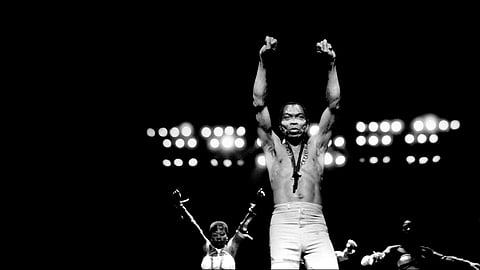

Fela Kuti was a prominent Nigerian musician and political activist widely considered as one of the most influential figures in the history of African music.
Kuti's style of music was a unique blend of different genres, including jazz, funk, and soul. He often incorporated elements of traditional African music into his compositions, creating a unique and infectious sound that resonated with audiences around the world.
His live performances and shows were legendary and always packed with energetic crowds, who danced and sang along to his music.
He was a charismatic performer, known for his energetic dance moves and stage presence. In his lifetime, the legend used his music as a platform to advocate for social justice and political issues in Nigeria.
Kuti was often arrested and harassed by the political establishment, but his determination and resilience only fuelled his activism and music.
Musical Contributions
Afrobeat:
Origins and Style: Kuti's band was unique in that it used two baritone saxophones instead of the typical one. This method is prevalent in African and African-influenced musical forms, such as funk and hip hop.
His band usually included two bassists and two guitarists performing interlocking melodies and rhythms simultaneously.
Fela Kuti is credited with creating Afrobeat, a genre that blends traditional African music with jazz, funk, highlife, and chanted vocals. It is characterized by its complex rhythms, extensive improvisation, and prominent use of brass instruments.
Afrobeat typically features a large ensemble, including a rhythm section (drums, percussion, bass guitar), a horn section (trumpets, saxophones, trombones), and keyboards. Fela himself played the saxophone, keyboard, and other instruments.
Influences: His music was heavily influenced by the American jazz and funk scene, particularly by artists like James Brown, as well as traditional African rhythms and melodies.
His songs were typically sung in Pidgin English, making them accessible to a broad audience across Africa.
Notable Albums and Songs:
Albums: Some of Fela’s most notable albums include "Zombie" (1977), "Expensive Shit" (1975), "He Miss Road" (1975), and "Coffin for Head of State" (1980).
Songs: Popular songs include "Zombie," which criticized the Nigerian military, "Water No Get Enemy," "Gentleman," and "Sorrow, Tears, and Blood," which addressed human rights abuses.
Entertainment Style
Kalakuta Republic:
Fela established a commune, recording studio, and performance space called the Kalakuta Republic, which he declared independent from the Nigerian state. This became the epicenter of his musical activities and a hub for his followers.
He also set up The Shrine, a nightclub in Lagos where he performed regularly. It was not just a music venue but a cultural and political center where people gathered to listen to Fela’s music and his political rants.
Performance:
Kuti's concerts were known for their elaborate stage setups, which included large sculptures and installations. The stage itself was designed to resemble a commune, symbolizing Fela's vision for a united and liberated Africa.
In addition to his live performances, Fela Kuti also released a number of albums throughout his career. His music addressed a wide range of topics, including poverty, corruption, and police brutality. Kuti's albums often included lengthy instrumental sections, allowing listeners to fully immerse themselves in the vibrant rhythms and melodies of his music.
Legacy and Impact
Influence on Music:
Global Reach: Fela’s Afrobeat has influenced countless musicians worldwide. His sons, Femi Kuti and Seun Kuti, have carried on his legacy, continuing to perform and innovate within the genre.
Cross-Genre Influence: Artists from various genres, including hip-hop, jazz, and electronic music, have drawn inspiration from Fela’s work. Bands like Talking Heads and artists like Brian Eno have acknowledged his influence.
Conclusion;
Fela Kuti's impact on the world of entertainment cannot be overstated. His music continues to influence and inspire artists from all walks of life, and his contributions to the world of African music are celebrated worldwide. Whether through his live performances, ground-breaking albums, or political activism, Fela Kuti left an indelible mark on the entertainment industry.
